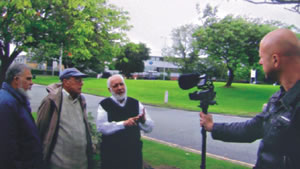Summary

The textile industry was a central part of British life for many centuries and offered people the opportunity to earn a living, often in difficult working conditions.
For people who migrated to Britain, the textile factories offered an easy avenue to find work and for most the wages offered compensated for the long hours and unsociable conditions that they had to work in.
Despite the working conditions, many people who worked in the textile factories mentioned the friendships that were made and the family atmosphere that existed between workers.
When the time came that the textile factories were being closed, many were saddened by this and for some this was the end of their working careers. However, others took the opportunity to try other professions and made successful transitions to other jobs.

Looking back, many people who worked in the textile factories had fond memories and to this day they still feel that it has a special place in their lives. Nowadays, the textile factories have been either demolished or converted into other uses and for current generations the realisation that a hotel once used to be a textile factory is not remembered. It is for this reason that the 'Cotton connects' project was undertaken in that the memories of people who worked in the textile factories can be stored for generations to come.
It is often said that to understand where you are going, you need to know where you have been. The textile factories have created the Britain that we have today and its legacy is going to be felt for years to come.

